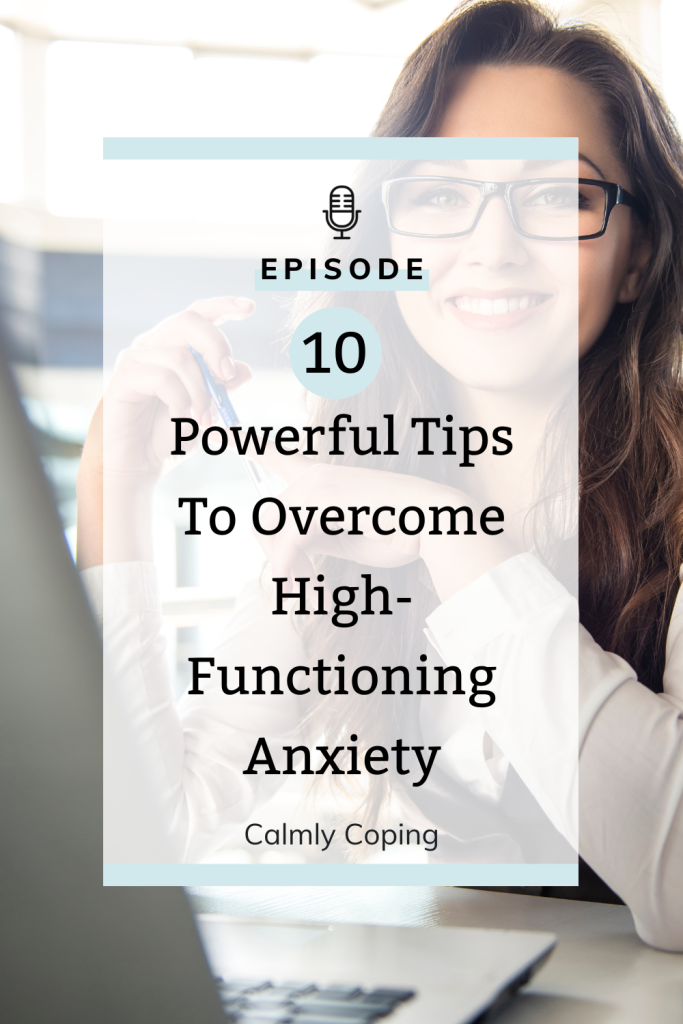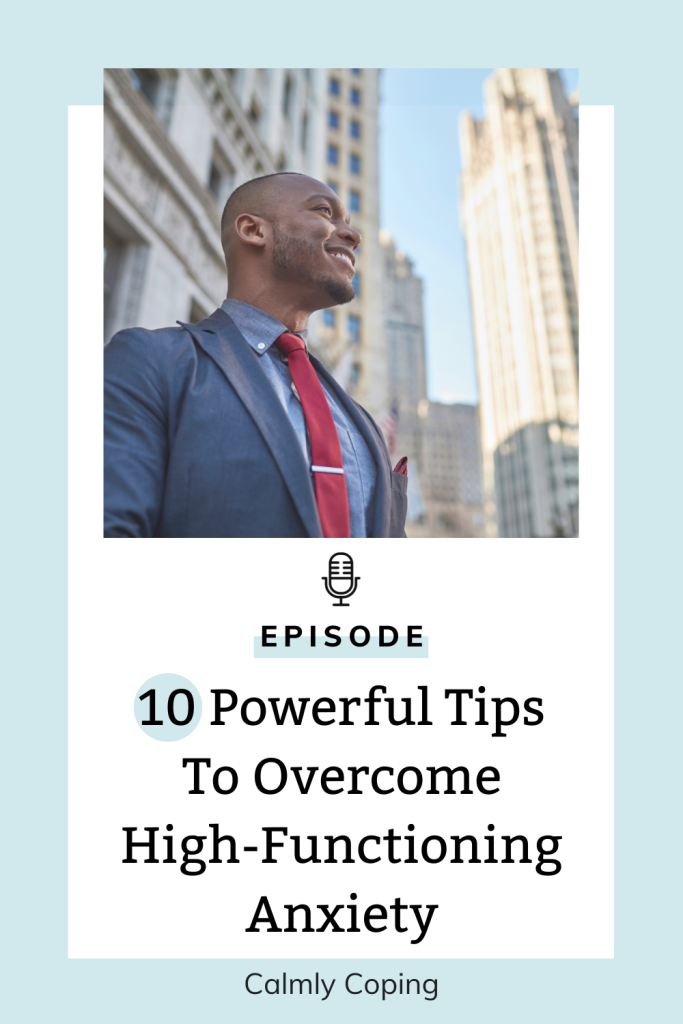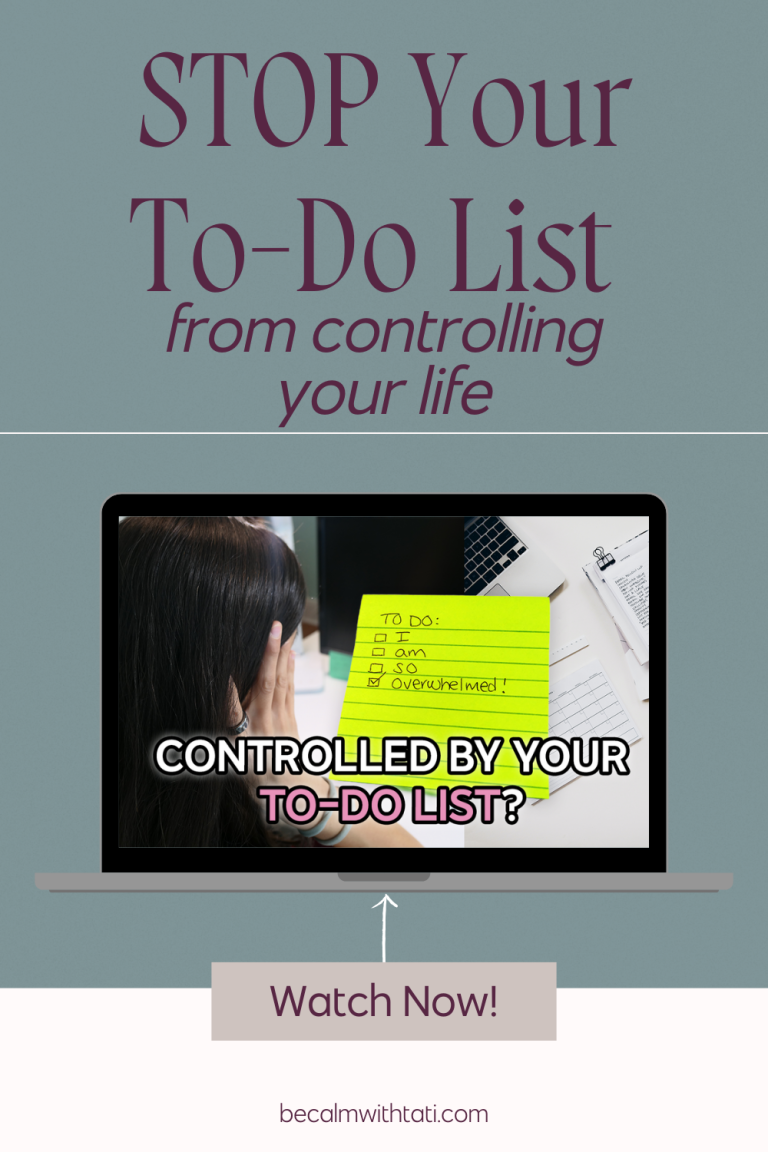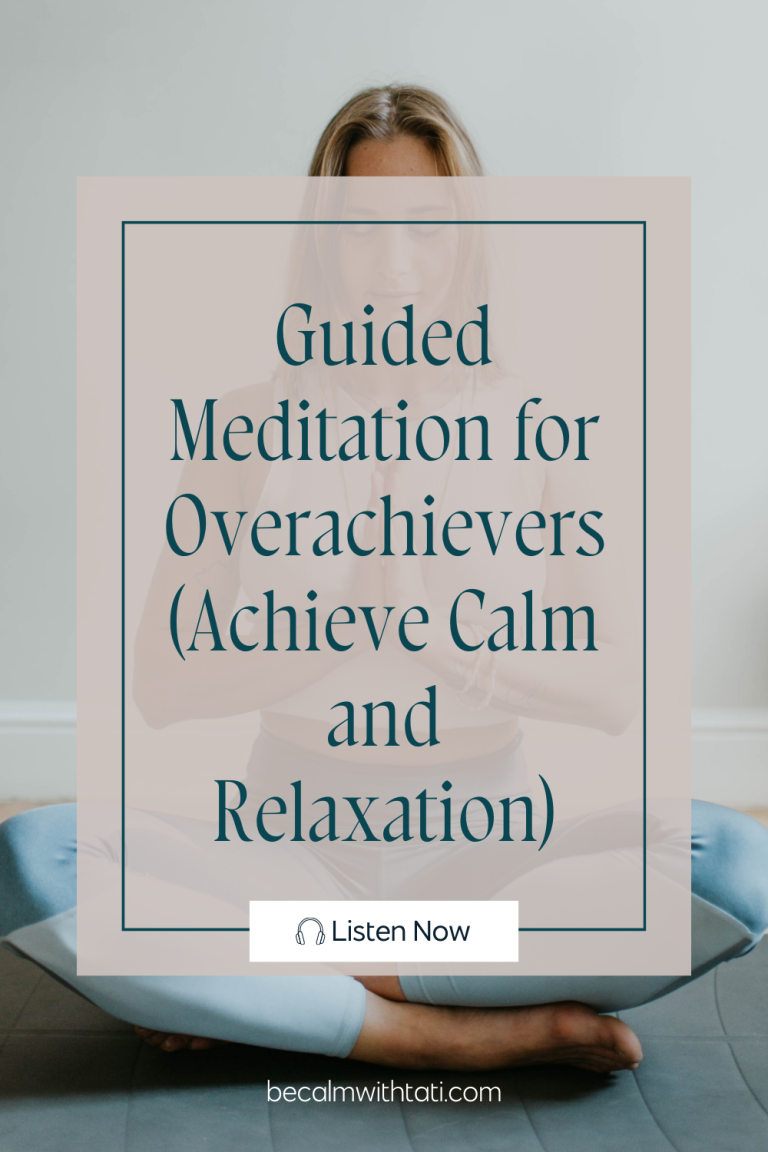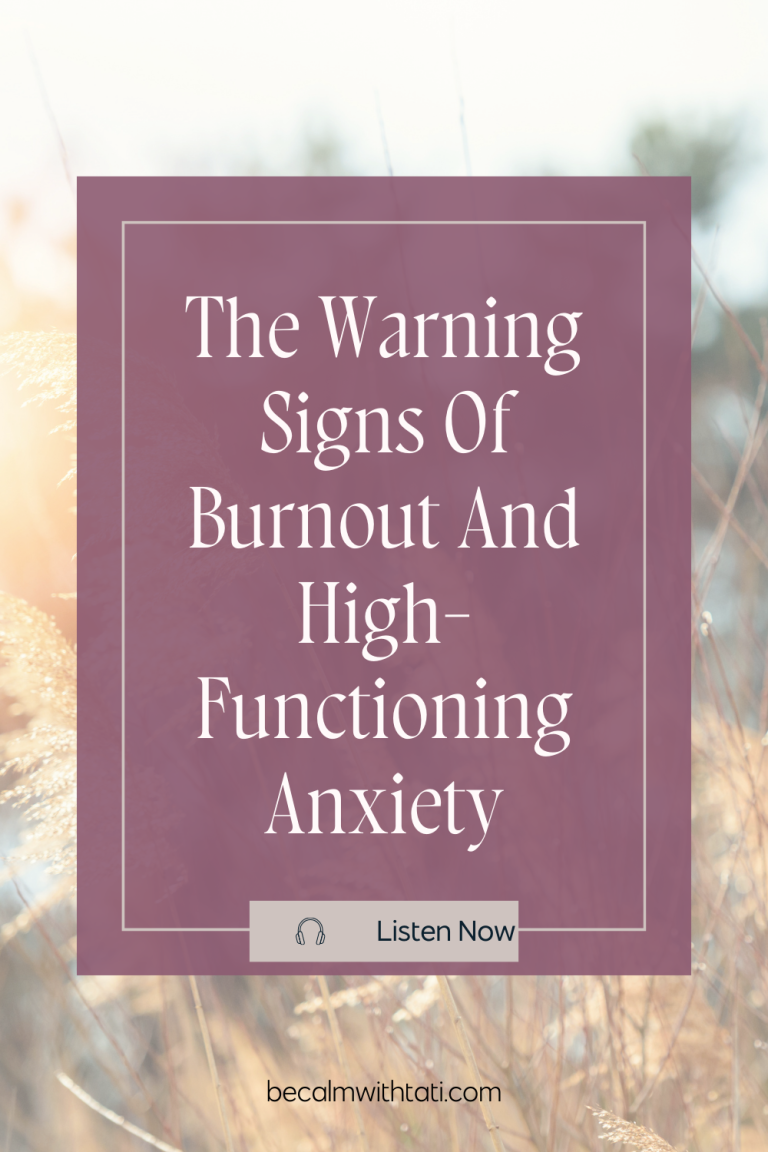If you’re somebody with high-functioning anxiety, you might be struggling with overthinking, putting tons of pressure on yourself, feeling overwhelm and self-doubt on the inside, while on the outside you appear successful, hardworking, detail-oriented, and calm.
It can feel exhausting to keep up this façade. So in this post, I’ll be sharing straightforward, yet super powerful tips to help you cope with high-functioning anxiety.
First, I want to validate that high-functioning anxiety can feel exhausting because of the fact that you are often trying to push through the struggles that you might be experiencing on the inside. You might be trying to demonstrate that, “I’m okay. I can do this,” and showing up and doing your best; whether it’s at work, in your relationships with family, or, however else that might show up for you.
You might wonder if you’re the only person who feels this way or struggles with this because it tends to be something that people don’t openly share. So you might think there must be something wrong with you. I want you to know there’s nothing wrong with you.
You’re Not Alone
I want to share a story about a client of mine who, when she first came to me, she used to beat herself up, stress, and worry about how she was doing at work. She would be hard on herself for doing things like not finding the time to work out and would overthink and procrastinate big projects, while at the same time, she appeared to be doing well on the outside to others.
Yet, you know, she kept things to herself and she was afraid to open up and share these things with others. I’ll share what happened with her in a little bit.
But first, I want to answer the question: Is high-functioning anxiety a problem that you have to live with your entire life?
Because this is something that I have been asked before.
It actually just came up last week in our Q & A call for my membership community, The Calm And Ambitious Membership, and it’s kind of a nuanced answer.
It’s yes and no. Yes, because you can’t ever get rid of anxiety a hundred percent because anxiety comes from fear and that’s a natural human emotion.
Anxiety can be protective. Let’s say if you’re in an actual situation where you’re in danger, you want to have that anxiety response show up, you want your body to go into fight or flight so that you can get out of danger.
However, you don’t have to live with high-functioning anxiety for the rest of your life; specifically, because you can get to a point where the struggles that you’re experiencing, the pressure that you’re putting on yourself, and the overthinking things you can work on, can negatively impact you and get in your way from moving towards the things that you want in life.
You can learn how to cope with things in a healthy way. You can stop catastrophizing things. You can start letting go of those unrealistic expectations and appreciate what you already have in life while still working for the things that you want.
So the client that I was discussing before, after I shared with her some of the tips, probably all of the tips that I’ll be sharing in today’s post, made huge changes in less than six months.
Anxiety’s no longer holding her back. She feels confident at work and has less self-doubt. She opened up to those that are close to her and has a support system.
She’s more compassionate towards herself, setting boundaries, and doing what she loves. And that’s what I want for you. So that’s why I’m going to be sharing these 10 tips with you today.

Tip #1
So first tip, I actually got from the book “Effortless” by Greg McKeown. He mentions in this book, “Don’t do today more than you can recover from before tomorrow.” And I think this is a powerful tip because when you have high-functioning anxiety, you might tend to push yourself too hard and try to do too much because there can be this idea that, “Okay, I want to get all of this done, and then I can relax,” or “So let me finish this so that I don’t have to worry about this, or so that it’s not weighing on me tomorrow.”
But oftentimes when we do that, we can be ignoring our body’s cues that it’s time to shut down, it’s time to take a break or take time with your family, or whatever relaxing might look like to you.
I love this tip because it helps you to reflect and tune in.
When it’s10 o’clock at night and you’re feeling the urge to check your work email and to just get this one thing done, ask yourself, “If I do this now, is this something I’ll be able to recover from before tomorrow or is this going to interfere with my rest? Am I going to feel frustrated and resentful and overwhelmed?”
So this is my first tip that I think can help as kind of a mindset thing to remember when you feel that urge to overwork or keep going or doing more.
Tip #2
Tip number two is to let go of the pressure and the outcome. I know this is easier said than done, but oftentimes we can add so much pressure onto ourselves on top of the external pressure we’re already experiencing. If you can intentionally bring awareness to how much pressure you’re putting on yourself above what’s already being put upon you, then you can start to bring awareness to that.
From there, you can start to make changes to the way that you’re treating yourself and see if you can start to be a little kinder to yourself. See if you could start to be a little more understanding with yourself.
The second part is letting go of the outcome. I think this is important because especially with anxiety, a big thing is a fear of uncertainty. Oftentimes we can try to mentally prepare for things or mentally plan for things as a way of trying to prevent uncertainty, prevent failure, or prevent negative consequences, which can actually create more stress and anxiety when you’re trying to do what you can to mentally prepare for things beyond just literally preparing for them.
When you can focus on just showing up and doing your best, regardless of what the outcome is, that can actually relieve some of that stress and pressure, and overthinking that we can unconsciously put on ourselves. So giving yourself gentle reminders, telling yourself to let go, taking a breath once in a while, and just allow whatever is here, however, you’re feeling, whatever is showing up to be okay.
Tip #3
My third tip is to say “no” more often. You may be the kind of person who is a people-pleaser. You may be the kind of person who is maybe saying “yes” to all of the things and trying to do everything, or maybe has a fear of missing out. Sometimes this can lead you to the place of burnout. If you’re doing too much or saying “yes” to too much, you might feel frustrated, and annoyed and you might feel pressured to say “yes” even if you really want to say “no.”
Saying “no” can be a skill that you learn and it can be something that you become more comfortable with over time. So that is my third tip, to practice, even if it’s in small baby steps, saying “no” more often.
Tip #4
My fourth tip and this one is SUPER IMPORTANT, is to increase emotional awareness because our emotions are often driving our behaviors. They’re often driving the way that we’re thinking about things; and many times with the vast majority of people, unfortunately, we haven’t been taught how to manage our emotions and how to process our emotions.
We are often taught to push them down and just keep on going, and that emotions are a sign of weakness, which is a bad thing. And the thing is, that emotions AREN’T a bad thing. They’re NOT a sign of weakness.
Emotions are the way that our bodies and our minds help us to identify what is important and help to urge us to take action in moments when we need to. For instance, if you are feeling anger, that might be a driver that you need to defend yourself, however, that might look like.
When you do not have an awareness of your emotions, then they are going to be controlling you without you even realizing it. It’s not about getting to a point where you’re controlling your emotions; it’s about getting to a point where you can listen to your emotions and recognize, “What is an actual signal that is important for me to hear?” or “What might be something that is coming from a place of fear and is trying to keep me safe, but maybe it doesn’t have all of the facts in the situation?”
Something that helps to kind of simplify the process of increasing emotional awareness can be to start a practice; whether that is journaling, I find that that’s a great way to increase emotional awareness. Focusing on every time you’re going to journal, “How am I feeling right now?” Or if you’re writing about something specific, “What emotions does this bring up in me?”
Just the simple act of labeling your emotions can be really powerful if you’re finding a place where there are a lot of emotions coming up or you’re distracting or avoiding, and things like meditation can also be helpful to help you release and work through difficult emotions.
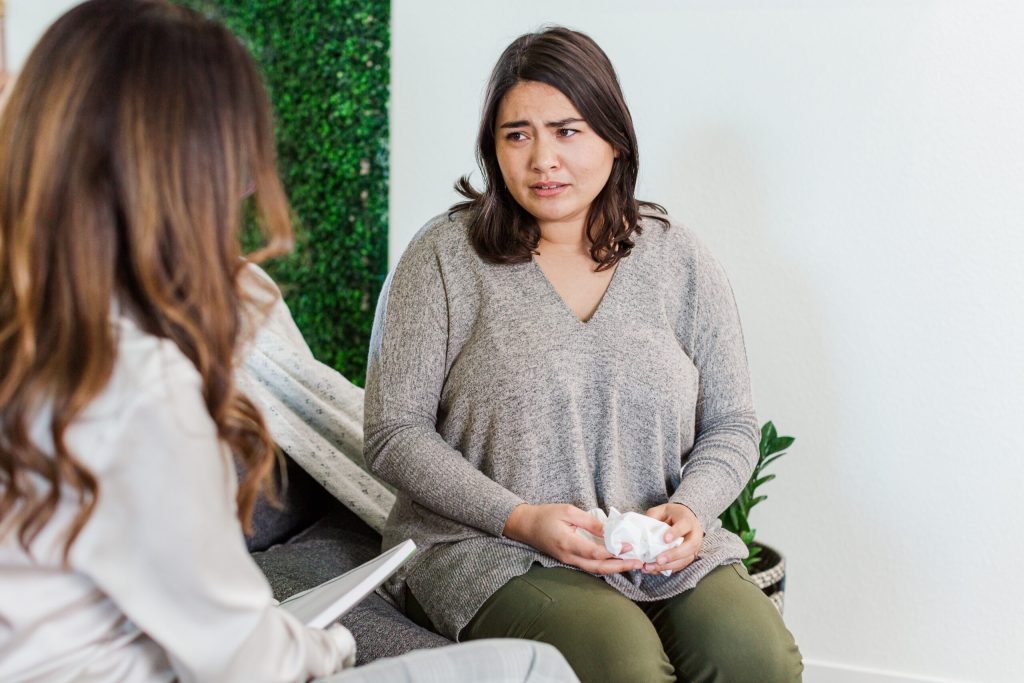
Tip #5
Tip number five is to do the thing that scares you. We’re dealing with high-functioning anxiety; and with anxiety, fear is at the root, and fear often leads to avoidance. So when you are avoiding things, then you can oftentimes make that fear bigger in your mind and actually make anxiety worse.
Obviously, we want to make sure we’re facing fears that are safe and that are things that we actually care about. Let’s say you’re afraid of heights, but it’s not something that’s negatively impacting your life, then it’s not necessarily something you need to go and face. But, if it’s something that is maybe getting in the way of you going towards your goals, then that may be something that you want to face.
So, for example, me going live today, even though I have done it a bunch of times at this point, still makes me a little nervous because I don’t think I’ve had enough practice in doing it. I’m worried about, “Oh, what if the tech doesn’t work out? Or what if I freeze?” or whatever else might come up.
However, despite that fear, I chose to show up and do the thing because it’s something that I want to do in order to grow the connection with you, whoever is listening, and watching, and to help me to become more confident. And so doing things that put you a little bit out of your comfort zone, put you a little bit into facing your fears can be really powerful in helping you to actually decrease that anxiety in the long run.
Tip #6
Tip number six is to make time for what you love. So this one might seem a little strange, I guess when it comes to talking about high-functioning anxiety. What does this have to do with that? However, this is really important because this is a way of filling up your cup, taking care of yourself, and doing things that are important and meaningful to you. Whether that is doing things that are creative, finding time to travel, getting outside in nature, spending time with loved ones, whatever it is, make time to do the things that help you feel good.
It doesn’t have to be going away for a week-long vacation. If you can’t make the time for that right now or if you’re not able to do that right now, even if it’s in small ways, it can really help to intentionally make the time for the things that are important to you. It can be so easy to get caught up in mindless tasks where you’re not actually choosing what you want to do.
What I mean by that is choosing how you’re spending your time. Scrolling through social media or binge-watching TV shows can be enjoyable and comforting in the moment. However, afterward, you may not feel the best. You might feel like, “Where has the time gone?”
And so if you can intentionally make time for doing the things that you love, and you don’t necessarily have to be super rigid with scheduling things out, but just once a day or once a week saying, “I’m going to find time for X thing.” That really helps to help me feel better and puts me in a good mood.
How Our Members Are Coping With High-Functioning Anxiety
Before we move on with the rest of the list, I got some suggestions on tips that help the members of the Calmly Coping Community to cope with high-functioning anxiety that I want to share with you. Jamie said, “I try to take breaks and pay attention to my overwhelm level.” So this is an excellent tip.
Sophie said, “If it’s overwhelming and the adrenaline is flowing, I try to get rid of the adrenaline by shaking hands, stomping feet, silently screaming, and then acknowledging any physical sensations and putting a name to the actual emotion all while practicing abdominal breathing and concentrating on the exhalation to help turn off the SNS, which is the sympathetic nervous system.”
Those are excellent tips. Get out that physical energy and then do what you can to recognize and acknowledge the emotion and calm down your body physically by taking deep breaths. Those are all super helpful tips.
You also put regularly practicing gratitude, which is powerful because that helps to train your brain to focus on the positive more. Tapping and grounding help too. Awesome. Love those tips. Thank you to everybody who shared.
And ironically, what I was talking about earlier in the post, is how I get nervous about going live. I’m like, “Oh man, what if there’s a tech error? What if something doesn’t work out? What if Facebook Live doesn’t work and people are waiting for me?”
That is literally what happened! And you know, stuff like that happens and there’s nothing I can do to change it now. So I choose to continue to move forward.
Tip #7
Tip number seven is to take care of your physical health. Taking care of your physical health is super important when it comes to managing anxiety and your mental health, in general.
That’s because our minds and our bodies are not separate. They’re connected. And so, what we’re doing to our physical health, to our body is going to influence our mental health.
When you do things, like exercise, that releases certain chemicals in your brain, such as endorphins, that help to put you in a good mood and that can help you to decrease anxiety. Studies actually demonstrate that exercise is just as effective as taking antidepressants for anxiety and depression. Antidepressants, even though they have the word depressant, are also prescribed for anxiety. So exercise can be super powerful for your mental health.
Do whatever works for you, that you enjoy, and that you’re actually going to stick to. It could be exercise, going to the gym, going for a run, or just doing whatever it is that you enjoy.
This could be stretching, doing yoga, or just being active.
It could be going for a walk and eating nutritious foods that are going to feed your body, and give you the nutrients that you need to care for your body and your mind in the long run.
A super important tip when it comes to caring for your physical health is getting enough sleep. Sleep is also super important when it comes to your mental health. Our emotions are actually processed in REM sleep.
That’s when we’re dreaming, and that’s why sleep can be super powerful to actually help us work through difficulties that are going on in our waking life.
If you’ve ever had a dream where you are, maybe in an exaggerated version of what’s happening in reality, or it’s metaphorically kind of similar to what’s happening in reality, that can be our brain’s way of working through the problems that we encounter in waking life.
Also, studies actually show that sleeping helps our body to convert short-term to long-term memory. So it also helps with memory, focus, and concentration in so many other things. I could go on and on about the benefits of sleep for your mental health, but that is a super powerful tip as well.
Tip #8
The next tip is to remember you are only one person. It can be so easy to have the expectation of wanting to do it all, wanting to be there for everybody. If you’re being hard on yourself if you’re not able to or taking it personally if you can’t do something that you really wanted to do because you don’t have the energy, it’s important to remember that just because you cannot do something does NOT mean that you’re flawed.
It does NOT mean that there’s something wrong with you. It just means that you’re only one person and we all have our limits. Our worth is not determined or defined by how much we do, how busy we are, or how much we are being productive, or anything like that. It is just essentially not defined by that and it’s okay to take breaks. It’s okay to slow down.
We all have limits. We all fail. We all make mistakes. I just made a mistake today. And that’s okay because we’re able to move on with it and we’re more resilient than we think.

Tip #9
The next tip is to identify your support system. This is super powerful because having a support system helps you to work through struggles and to have somebody that you can talk to when you need support so that you don’t feel isolated. As humans, we need connection. When we don’t have a connection, that can actually be really negative for our mental health.
So whether it is a friend, a family member, an online community such as this one, or my Calm And Ambitious Community, if you’re interested in joining us there; find your community. It could be an in-person group or maybe your support system includes your therapist, whoever that support system is for you it’s important to make sure that this is somebody that you can talk to or these are people that you can talk to.
If you feel as though you are really struggling and you need help, it’s important to find people that are going to be able to listen compassionately. And of course, nobody’s perfect, and nobody’s going to be able to listen a hundred percent of the time. Finding someone that you trust and feel safe with is super powerful for overcoming high-functioning anxiety.
Tip #10
My last tip is: You can handle it. Because with anxiety, your mind often tends to go to the worst-case scenario. It tends to think that everything is going to be the end of the world. It feels really scary and it feels really challenging. And I want you to know that regardless of what that worst-case scenario is, as long as you’re still here, you can handle it.
You know, it’s probably not all that likely that the worst-case scenario is going to happen; and even if it does happen, just say, “I can handle it. It’s not the end of the world.”
Just like what happened today with Facebook Live, it did not automatically go live in the way that I was planning. It happened. I was a little nervous about something like that happening, and I managed the situation.
Most people tend to be understanding of things like that. Oftentimes, what we perceive as the reactions from other people or the consequences of these things happening tends to be so much more exaggerated than what it actually is in reality.
So it can help to actually get some perspective and to look at like, “Okay if my friend were worrying about this right now or were struggling with this right now, what would I tell them?”
That can help you to get some perspective, to help you to see that what you are worried about may be just coming from a place of fear and strong emotions, and not necessarily looking at things from a more logical and factual or evidence-based perspective.
So those are my tips for coping with an overcoming high-functioning anxiety. If you’re looking for more support in overcoming high-functioning anxiety and my signature formula, I have an entire training to help you overcome high-functioning anxiety in 90 days.
You can learn more about it by going to calmlycoping.com/workshop and signing up for free. It’s an on-demand workshop so you can watch it at your pace whenever you’re comfortable doing so.
Thank you so much for tuning in, and until next time, be calm.
Interested in diving deeper to get support for high-functioning anxiety?
I offer 1:1 coaching to help high-achievers overcoming high-functioning anxiety so they can feel calmer, more present, and have improved balance in their lives. Click here if you’re interested in learning more and getting started.
Calm, Balanced, & Confident is my comprehensive A→Z self-paced course to help high-achieving professionals overcome high-functioning anxiety so they can feel calmer, balanced, and more confident without the anxiety and overwhelm. Click here to learn more and enroll today.
Looking for ongoing support and guidance with high-functioning anxiety? The Calm & Ambitious Community is the exclusive community for high achievers with high-functioning anxiety. Click here to learn more and join us today!
